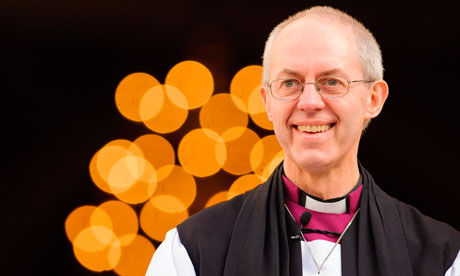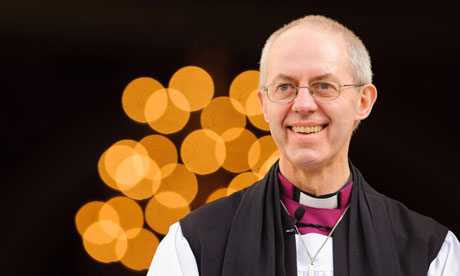Justin Welby is keen to recover the economic meaning of salvation as redemption. We are lucky to have him

The archbishop of Canterbury, Justin Welby, wants the Church of England to expand credit unions as an alternative to payday lenders. Photograph: Dominic Lipinski/PA
"Forgive us our sins, as we forgive those who have sinned against us." The familiar words of the Lord's prayer, right? Except, in the earliest Greek manuscripts, the word isn't sins, it's debts. "Forgive us our debts as we forgive our debtors." That is how the King James Bible renders the Lord's prayer, though it still feels clunky when used in church.
But it feels even more clunky in the context of the whole Jesus v Wonga debate. The archbishop may want the church to have a greater role in supporting credit unions. But what sort of a lending model can be sustained when the mission statement of that organisation has the forgiveness of debts at its heart?
OK, to be fair, it's not the church that will be doing the lending on the Welby plan. The idea is for the churches (who have more outlets that the banks) to offer their facilities and human resources in support of credit unions. And it is credit unions that will be doing the lending. But even so, the church does have serious historic issues with money and the advent of a capitalist archbishop serves to bring these to the surface.
Though lots of Christians talk about sin (often translated in the mind as sexual misadventure), debt is the more basic theological category. Redemption, for instance, is a word that the church has borrowed from the ancient financial services industry. It is the recovery of something pawned or mortgaged. In a world of slavery, that something can be one's very life. And so it is today. Those who are trapped in Wonga's wicked 5,000% APR, often borrowing money to pay off other loans, thus deepening the crisis, have their lives owned by other people – by those, in this instance, making £50m a year profit off their misery. This is modern slavery.
Those who argue that it is not the church's business to get involved in this have little knowledge of the Bible. Redemption is absolutely what the church is for. And it is something supremely practical. Of course, when the church itself was subject to a successful takeover bid by the Roman Empire, all this forgiving debts stuff had to be re-imagined (as did all the anti-war stuff too). And what better way for the marketing department of the Caesars to do this than to turn its newfound religion into something spiritual. Better "blessed are the poor in heart" (St Matthew) than "blessed are the poor" (St Luke). And in this process of ideological rebranding, sin becomes a more convenient category than debt.
But if the debt and slavery idea was conveniently re-thought, the church retained a peculiar and eventually poisonous doublethink about money. Lending money at interest was deemed a sin for centuries. And this meant that Christians ended up forcing Jews to do it for them, and then hating them for doing it, thus generating the conditions for European antisemitism. It took Calvin to argue that usury was not lending money at interest but lending money at excessive interest. As Max Weber famously explained, this was the point at which capitalism was given moral sanction by the church. Even so, Calvin would have been perfectly comfortable with the idea of legislating against Wonga's 5,000% APR – ie a cap on interest rates – rather than having to out-compete them through credit unions, which is the Welby caring-capitalism plan.
And however much I am with Calvin on this one, the C of E is lucky to have found an archbishop who is keen to recover the economic meaning of salvation as redemption (listen up, church commissioners). In Liverpool and Durham, he recognised the existence of modern slavery. And thank God he is pressing the church to do something about it.

